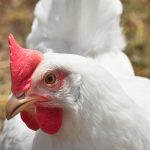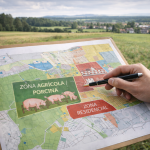In October, ChileCarne attended two of the most important meetings for animal production in Latin America, both held in Miami: PorciForum LATAM 2025, which gathered the region’s pig farmers around sustainability, biosecurity, and production efficiency; and the LPN Conference & Expo 2025, focused on the latest trends and challenges in the poultry industry and animal nutrition.
Both conferences brought together leaders, experts, and companies from the agricultural sector to strengthen technical exchange and promote regional cooperation toward more innovative, sustainable, and competitive production. ChileCarne was represented by Ignacio Marchant and Carolina Larraín, the heads of Pig and Poultry Health, respectively, who highlighted the importance of these forums for sharing experiences, updating knowledge, and strengthening technical cooperation with other countries in the region.
PorciForum LATAM 2025: Strategy and sustainability for a competitive pig farming industry
Over three days, the event brought together representatives from the Latin American pig farming sector to discuss key topics, including strategy and workforce management, applied nutrition, international production models, biosecurity, and animal welfare. The technical program addressed the sector’s main challenges, from production efficiency to animal health and environmental sustainability, featuring leading international experts.
For Ignacio Marchant, it was a valuable opportunity to share knowledge and innovations shaping the future of pig farming worldwide. As he explained, “one of the main lessons learned was the need to continue moving toward sustainable, mechanized production with high standards of animal welfare and biosecurity, which are crucial to maintaining international competitiveness in today’s world.”
The forum also emphasized the importance of strengthening strategies for preventing and controlling high-impact diseases, such as porcine reproductive and respiratory syndrome (PRRS), underscoring that animal health is the foundation of sustainable production. Along the same lines, Marchant emphasized that the primary threat to pig farming in Latin America remains African swine fever (ASF), which is currently present in the Dominican Republic and Haiti, posing a risk to the entire continent. “At the local level, ChileCarne has worked to strengthen public-private collaboration with Chile’s Agricultural and Livestock Service (SAG), reinforcing epidemiological surveillance, border control, and ongoing training for producers, workers, and veterinarians in best biosecurity practices and timely notification,” he explained.
The meeting concluded with an agenda focused on innovation, professional development, and technical cooperation—essential pillars for the sustainable growth of pig farming in Latin America.
LPN Conference & Expo 2025: Innovation and biosecurity in Latin American poultry farming
In its latest edition, the event brought together renowned representatives from the poultry and animal nutrition industries across Latin America, featuring a high-level technical program that addressed the sector’s primary health, production, and technological challenges. The conferences combined opportunities for professional development with networking and international collaboration, encouraging the exchange of experiences between producers, academics, and experts.
According to Carolina Larraín, attending LPN was an opportunity to reaffirm Chile’s health leadership and strengthen international cooperation. “Poultry farming faces the ongoing challenge of improving sustainability without losing competitiveness. Participating in LPN allows us to learn about successful experiences, share lessons learned, and reinforce Chile’s commitment to the highest biosafety standards,” she said.
Larraín added that, compared to other countries in the region, Chilean poultry farming is at the forefront in emergency systems, contingency plans, and surveillance programs, which solidifies its reputation for animal health and safety. “While we share common challenges with other countries, these forums strengthen unity and mutual support in facing health events, as well as promote partnerships with universities, laboratories, and trade associations to improve research and responses to outbreaks or threats,” she explained.
A shared commitment to health, innovation, and cooperation
ChileCarne’s participation in these prominent forums reaffirms the industry’s commitment to health, safety, and biosecurity in the sector, as well as fostering international collaboration, which are strategic pillars for strengthening the country’s production and maintaining the confidence of international markets.
Spaces for technical dialogue reaffirm Chile’s leadership in animal health matters and demonstrate its commitment to continuing to build, together with the rest of the region, a more resilient, sustainable, and competitive pig and poultry industry.






